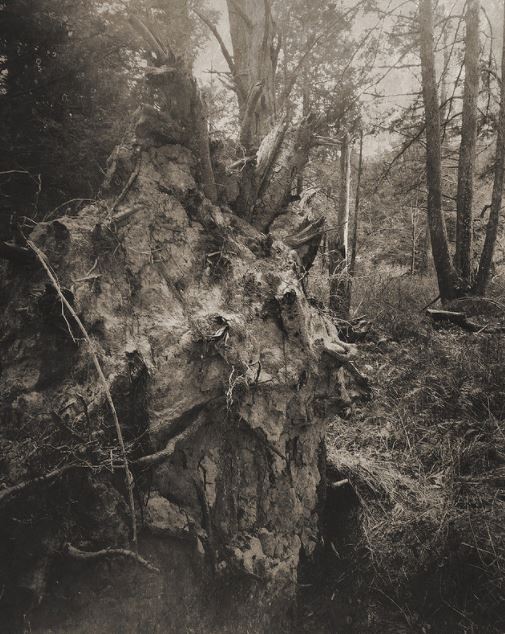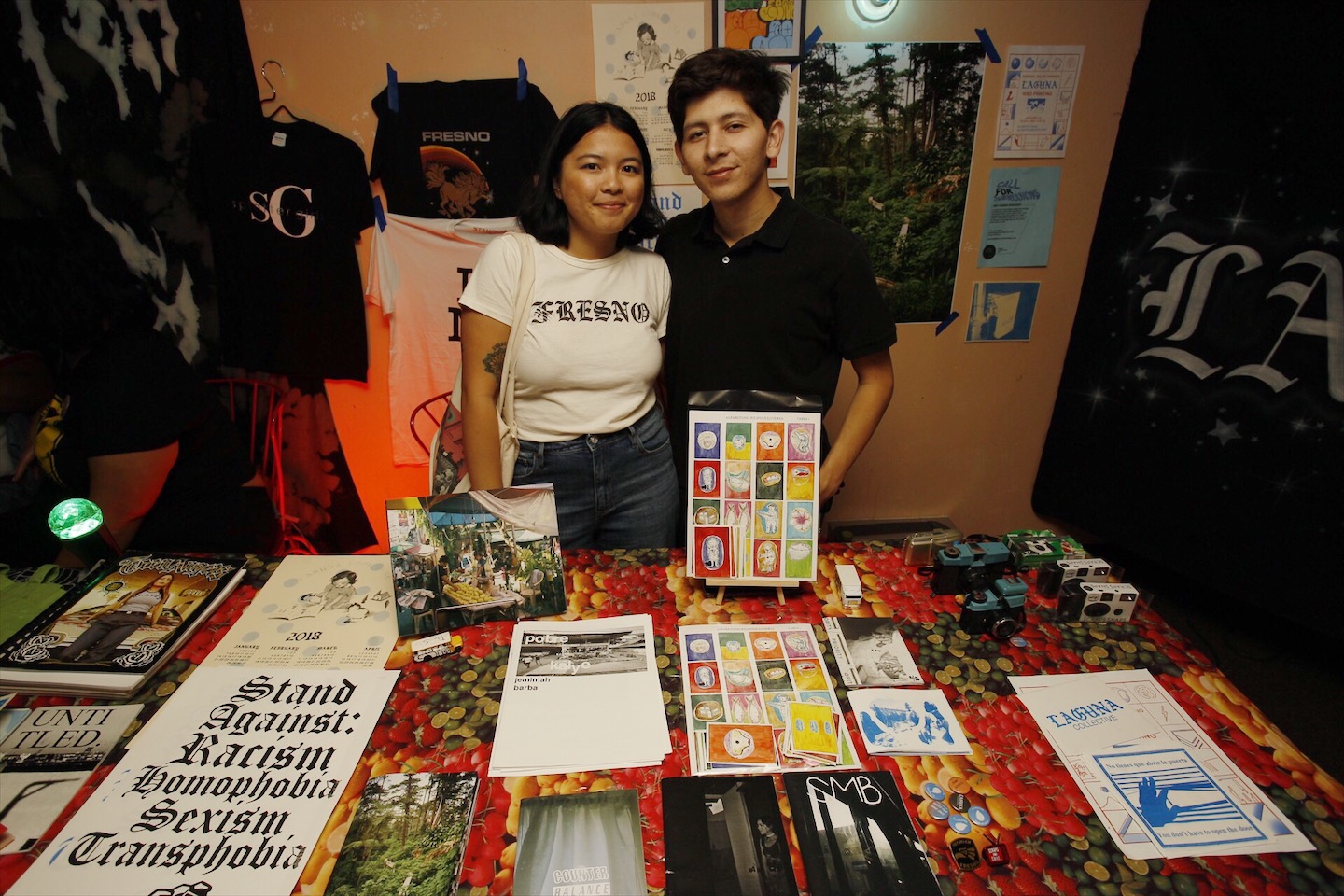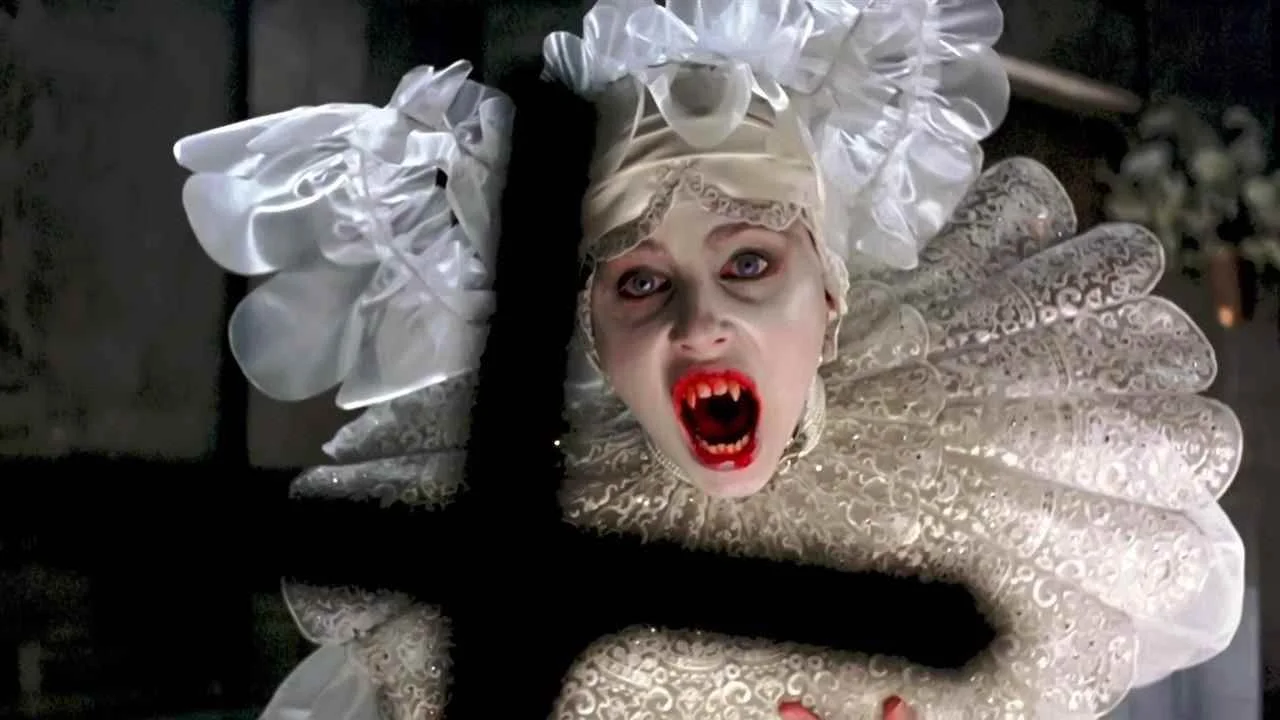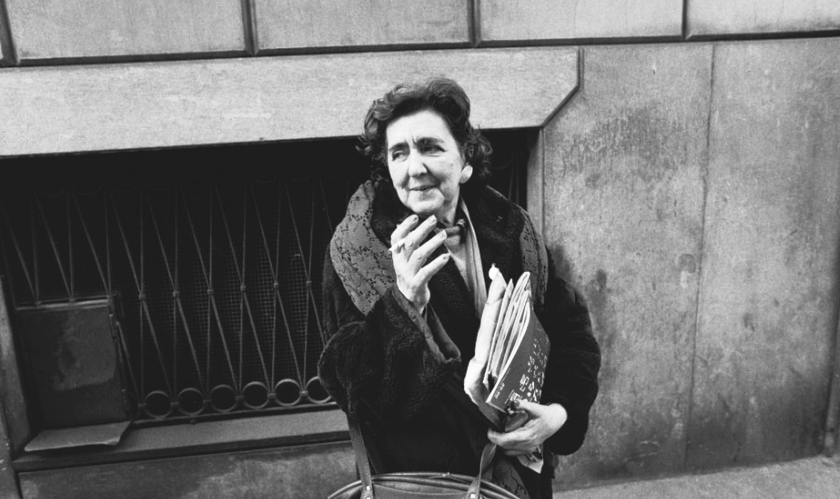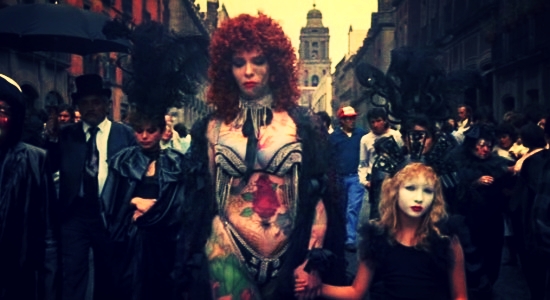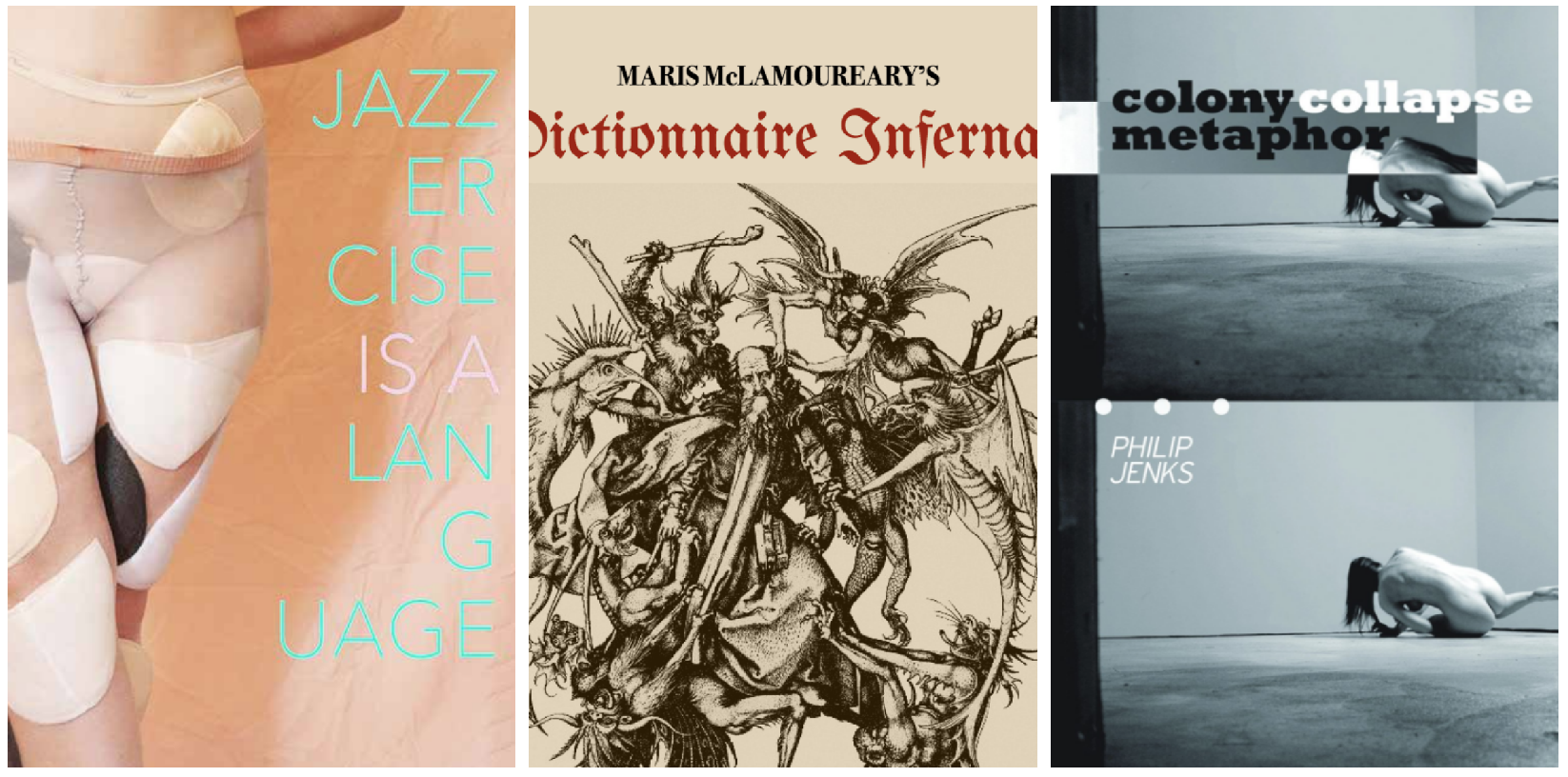Joanna C. Valente is the author of Sirs & Madams, The Gods Are Dead, Marys of the Sea, Xenos, and the editor of A Shadow Map: An Anthology by Survivors of Sexual Assault.
Read MorePoetry by Raquel Vasquez Gilliland
Ages ago, this town was all wood.
You had to get to know each tree as a
madrina. You knew this birch that creaks
with wind guides you west; this willow with
bark soft as hair would sing songs from
before the arrival of sky. And everyone
could hear the spirits.
Alice Teeple
Dear Jesse, by Andi Talarico
BY ANDI TALARICO
Dear Jesse,
Happy 29th birthday in prison.
Dear Jesse,
I write this to you on your 29th birthday, which you’ll spend in prison.
Dear Jesse,
Happy Birthday, little brother, in prison.
Dear Jesse,
I meant half-brother. It matters.
Dear Jesse-
I don’t know how to write this letter. I don’t know how to do it.
Dear Jesse-
I’m sorry.
Dear Jesse,
I hate you.
Dear Jesse,
Her life mattered too.
Dear Jesse,
She was 23. She was 23 and you gunned her down over $60 worth of shit heroin. You did that.
Dear Jesse,
I hate you.
I hate you for making this family the wrong kind of poor. A snarl of statistics on rural poverty, a tragedy so common, so small, you’re not even a footnote in the 10 page New Yorker article on the opioid epidemic. I read it on the train to work. I read a clinical article on the pharmaceutical industry on the train to work in New York City. In my ears, airpods scanned the highs and lows of Chet Baker. The most distant mirror.
I read about your world at arm’s length. I thought of you saying-
“Fuck you, Andrea, and your perfect fucking life.”
“Give me 20 bucks, Andrea. I know you got it.”
“You’re not better than me.”
I’m not.
I am.
I’m not.
Dear Jesse,
I watch your arrest on the news. They show a picture of the dead girl on the bottom right corner of the screen. The reporter asks you what you have to say for yourself. You snarl,
“Get out of my face.”
I am.
I’m not.
I am.
Dear Jesse,
I know you’re no broken branch on a perfect family tree. Not even a tree, really, a snarl of a thorny bush, really, a tangle of blighted limbs, really. To call anything that happens here cyclical is to bestow too much order upon it. Really.
Dear Jesse,
We have different fathers. Yours was not a great man. Let’s say that. Let’s remember that when his chemicals crested or cratered, the wrong pill, say, the wrong smoke, the wrong spike, the wrong sniff, it usually ended badly for our mother. You’re too young to remember her broken arm. You’re too young to remember when he still drank. I watched him pour a beer over her head during an argument. I watched her hurl a glass ashtray at his face and almost blind him.
Dear Jesse,
I remember.
Dear Jesse,
I was seven when you were born, barely not a baby myself. I learned how to love a new human through you, your bright brown eyes reflecting everything you saw around you, new and holy through you. You, on my hip. You, taking the bottle in my hand. You, a small version of me. You, making a big sister of me. You. You named me DeeDee. I named you Young King. I wanted to give the world to you. You.
Dear Jesse,
Our mother joked that she named you for Jesse James. She always liked the bad boys best.
Dear Jesse,
Your father was one of the worst.
Dear Jesse,
I know it was right after he died that you spent your first bout in Juvie. What were you, twelve? Thirteen?
Dear Jesse,
I know that you chose violence over grief, or violence through grief, or violence as grief, or that maybe violence is a grief, or that maybe grief is a violence in that it can murder the person bearing the weight of it.
Jesse,
It is not lost on me that your drug of choice is a pain-killer.
Dear Jesse,
I love you.
Dear Jesse,
I hate you.
Jesse,
That poor woman. I grieve for her life.
Jesse,
You poor child. I grieve for yours as well.
Jesse,
The letter I send will say just this,
“Dear Jesse,
Try to have a happy birthday. You know I’m here if you need books. Love you, little brother.”
Andi Talarico is a Brooklyn-based writer and reader. She’s the curator and host of At the Inkwell NYC, an international reading series whose New York branch meets at KGB Bar. She's taught poetry in classrooms as a rostered artist, and acted as coach and judge for Poetry Out Loud. In 2003, Paperkite Press published her chapbook, Spinning with the Tornado, and Swandive Publishing included her in the 2014 anthology, Everyday Escape Poems. She also penned a literary arts column for Electric City magazine for several years. When she’s not working with stationery company Baron Fig, she can be found reading tarot cards, supporting independent bookstores, and searching for the best oyster Happy Hour in NYC.
Photo captions by Barba.
My partner and I in Bakersfield for their First Friday in January 2018.
That Zine Life: Laguna Collective's Jemimah Barba
Paper, pen, stapler. Your voice.
Read MoreWriter & Artist Joshua Byron on Being Nonbinary & Navigating the Dating World
Joanna C. Valente is a ghost who lives in Brooklyn, New York, and is the author of Sirs & Madams (Aldrich Press, 2014), The Gods Are Dead (Deadly Chaps Press, 2015), Marys of the Sea (The Operating System, 2017), Xenos (Agape Editions, 2016), and Sexting Ghosts (Unknown Press, 2018). They are the editor of A Shadow Map: An Anthology by Survivors of Sexual Assault (CCM, 2017), and received a MFA in writing at Sarah Lawrence College. Joanna is also the founder of Yes, Poetry, a managing editor for Luna Luna Magazine and CCM, as well as an instructor at Brooklyn Poets. Some of their writing has appeared in Brooklyn Magazine, BUST, Them, Prelude, Apogee, Spork, The Feminist Wire, and elsewhere.
Read MorePoetry by Amy Saul-Zerby
Amy Saul-Zerby is the author of Deep Camouflage (Civil Coping Mechanisms) and Paper Flowers Imaginary Birds (Be About It Press). Her poems have appeared in Painted Bride Quarterly, Spy Kids Review, Mad House, and Bedfellows Magazine. She is editor in chief of Voicemail Poems and a contributing writer at Fields Magazine and The Rumpus.
Read More3 Poems by Cathleen Allyn Conway
BY CATHLEEN ALLYN CONWAY
Author's note: These are all found works, some using modified versions of traditional poetic forms. Their sources are Toby Whithouse's Doctor Who episode VAMPIRES OF VENICE, Stephen King's SALEM'S LOT, the stage adaptation of LET THE RIGHT ONE IN, miscellaneous Sylvia Plath poems, and DRACULA by Bram Stoker. They are part of a longer work, Bloofer, a collection of found poems on the female vampire that forms the creative component of my PhD thesis.
THE VAMPIRE WHO SAID HE WAS YOU
He bites. A mouth just bloodied.
The blood flood is the flood of love.
A love gift utterly unasked for.
Death opened, like a black tree, blackly.
The box is only temporary, the
black bunched in there like a bat.
I bleed or sleep all the blackening morning,
separated from my house by headstones and corpses.
I am red meat, red hair; marble facades.
The corpse at the gate petrifies as I rise.
THE VILLAGERS NEVER LIKED YOU
I wake to a mausoleum.
This is the room I could never breathe in.
Black bat airs wrap me, raggy shawls,
blue garments unloosing small owls.
Eternity bores me; my soul dies for it.
I eat men like air. I never wanted it.
LUCY’S SWEET PURITY
I could see in the white flesh a dint
then Arthur struck with all his might:
contorting and cut, The Thing writhed,
a blood-curdling screech from red lips.
Arthur never faltered, deeper driving
His stake into the body, twisting and wild,
crimson foam smearing white,
blood from the pierce welling, welling.
The teeth ceased to champ,
the writhing became less.
On his forehead sprang
drops of sweat, broken gasps
came his breath, and a light
broke his face, glad and strange.
Cathleen Allyn Conway is a PhD creative writing research student at Goldsmiths College, University of London. She is the co-editor of Plath Profiles, the only academic journal dedicated to the work of Sylvia Plath, and the founder and co-editor of women’s protest poetry magazine Thank You For Swallowing. She has previously worked as a journalist on UK trades and national newspapers, and as an English teacher in inner London. Her poetry has appeared in print, online and in anthologies. Her pamphlet Static Cling was published by Dancing Girl Press in 2012. Originally from Chicago, she lives in south London with her partner and son. You may follow her intermittent feminist ranting and retweets at @mllekitty.
Daily Mail
On Being Pregnant, Peaches Geldolf and Mental Illness
In a strange way, she has become my pregnancy muse.
Read MoreThis Music Playlist Will Make You Feel A Million Times Calmer
Joanna C. Valente is a human who lives in Brooklyn, New York, and is the author of Sirs & Madams (Aldrich Press, 2014), The Gods Are Dead (Deadly Chaps Press, 2015), Marys of the Sea (The Operating System, 2017), Xenos (Agape Editions, 2016), and Sexting Ghosts (Unknown Press, 2018). They are the editor of A Shadow Map: An Anthology by Survivors of Sexual Assault (CCM, 2017). Joanna received a MFA in writing at Sarah Lawrence College, and is also the founder of Yes, Poetry, a managing editor for Luna Luna Magazine and CCM, as well as an instructor at Brooklyn Poets. Some of their writing has appeared in Brooklyn Magazine, Prelude, Apogee, Spork, The Feminist Wire, BUST, and elsewhere.
Read Morevia Shutterstock
On the Friend of My Life
Part of growing up with someone is learning how to grow apart too. When we started high school we drifted a little. Our senior year we had anatomy together and became friends again. We spent every morning together in the commons area eating breakfast. Our friend, Emily, dubbed us "The Breakfast Club" and decided which characters from the film we were. The night we graduated we all rode together to the local movie theater still in our graduation regalia and we watched back to back movies before going home. My own family had pizza and gathered together, but we went out together instead. I still think about it a lot: the way friends become family.
Read MoreExcerpts from "Dress Code Aquarium" by Benjamin Niespodziany
The doctor wasn't supposed to
but she prescribed herself
to try new things.
"Something new once a week,
repeat, repeat."
via ArtSpecialDay
A Poet I’ve Never Heard Of: Alda Merini
Alda Merini put a lot of poetry and other writings into this world, but it is hard to find a lot of it translated! Below you will find both poems and aphorisms, or as Merini called them "spells of the night."
Read MoreVia Film Equals
Strange Beauty: The Female Body Spectacle in Jodorowsky's, Santa Sangre
Her body is an “exotic” thing that cannot rest within the boundaries of appropriateness.
Read MoreBody Ritual: 12 Very Real Things I Learned About Chronic Illness
BY LISA MARIE BASILE
Body Ritual is Lisa Marie Basile's weekly column about wellness, chronic illness and finding healing and autonomy in ritual. You can follow her on Instagram for more on this topic.
Where are all my autoimmunies and chronic illness survivors out there? I wrote this for you—for those who are newly diagnosed, as well as those who aren't but have few people to relate to.
I'd like to start this column off by saying: I have ankylosing spondylitis. It's a degenerative, inflammatory, chronic disease that primarily affects my spine, causing the vertebrae to fuse (which would leave me immobile and in chronic pain). It also affects my eyes, stomach, heart and most of my other joints. I am constantly in pain (each day it's a new inflamed body part and pain level, what fun!) and deeply fatigued—as if my soul is somewhere off in a deep sleep.
The key to the management of this disease is medicine (some risky ones, called biologics, among others) to prevent degeneration, eating well and constant movement. This sounds easy—but it's a holistic lifestyle change that people without chronic illness probably can't imagine.
I don't always seem sick on the outside. In fact, I seem everything I am not, for the most part. Ankylosing Spondylitis is not as well known as, say, Rheumatoid Arthritis or Lupus, so almost no one has ever heard of it—but there are 200,000 Americans living with it, and I am one of them.
Here’s what I’ve learned over the years—before I knew I had a disease, and after I found out about it:
1. You may feel all alone.
For the past 10 years, I knew something was wrong with me. Like a lot of people with chronic illness or autoimmune/autoinflammatory disorders, I went through a dead-end labyrinth to get my diagnosis. I also went through long periods of so-called 'remission' where I never even felt sick. In college, I felt intensely, deeply tired when my friends were wide awake (and partying!), and my back always just 'happened' to hurt.
By grad school in my mid-20s, I had so many eye issues (uveitis, inflammation of the inside of the eye), that I developed cataracts from steroid use. Going to class made me want to die, I remember. The halogen lights were destroying me. This illness was the first sort of port-of-call for me, signaling doctors to what was really happening systemically. Before then, doctors say I'd needed vitamins, exercise, and more sleep. Sure, okay. They also asked if my pain tolerance was "low," as if I was making things up. This is both a form of gaslighting and medical negligence.
But throughout this time, before I knew what was wrong, I felt so alone, and I started internalizing the idea that I could be, somehow, lying about my symptoms—lying to my friends about being tired, lying that I was achy, lying that something wasn't right. I started to internalize their reactions to me: "Well, you seem totally fine! You're young and healthy. I'm sure it'll be OK." I didn't realize then how reductive and hurtful this all was. That sort of positive reassurance doesn't leave much room for someone to consider the reality of what I'm saying—we're socialized to say "It's gonna be okay," rather than, "Oh shit, that sucks, I'm sorry." And that's so tiring.
I was moving through life as a ghost, gauzy and see-through, but my-god, I thought, I am here. Fast forward several years: At 31, when I finally had good enough insurance, I got the lab imaging, blood-work, and checkups done to confirm my diagnosis. And then—like that—that was it. I had it. And it was still my little secret to tend to. Me, alone.
2. You will grieve.
Getting a diagnosis is shattering—and no one else in your life gets it. Not your spouse, not your job, not your friends. The grief is circuitous; you grieve that your body is not like everyone else's body, you grieve because it means you will forever have something to look after. It's like a little garden, a little creature living inside you—only it's somewhat malicious and fucked and wants to make it so you go crazy (and maybe even go broke). When I was diagnosed, I went straight through some of the grief stages. Mine, of course, started with denial:
"You'll need medicine forever," the doctor says to me. He's staring at a screen that shows where my sacroiliac joints have begun to fuse. "Well, I don't know about all that," was my first response. This must be a mistake, or you must be trying to prescribe me things because you get money from Big Pharma, I think. For the next month, I cycled through depression, rage, some more denial, self-pity, back to depression—and, finally, acceptance. (This comes and goes, like water, rippling). I say to myself: If I do not take this medicine, eat this food, and workout, I will not be able to move one day. One day soon. As in very soon, maybe. And I'm not talking ouch-my-knee-hurts-pain. I'm talking NO-MOVEMENT pain. I'm talking inflamed organs, like my heart. Loss of vision. Loss of quality of life. I could lose my job, my ability to write.
This isn't easy, and the grief is very private and very lonely. You can know that there are people who understand, but sometimes not even that makes it easier. That's OK. You're allowed to grieve. One of the things I do is keep a journal—I write about why it hurts, how I feel, and I even write letters to myself. Sometimes I'll burn a candle at the end of the day (sometimes in the tub) and just sit with it, looking into it, taking that moment for myself—to see, hear, and be with my body. This helps when I'm dealing with pain or medical frustrations.
3. You will see the global impact of your disease.
Not everyone has good insurance. I didn't for the majority of my life—and I am sure one day I will go without again. This is debilitating to someone with chronic illness, especially if that person is marginalized—a person of color, a person in the LGBTQIA community, an immigrant.
In my Ankylosing Spondylitis support group, I see people who are able to access their medication (many of us take Biologics, which cost around $7000 a month without insurance). Others have partially-subsidized coverage. Others have no coverage. Others, in different countries, won't get the medicine AT ALL. It is horrifying to see a 27-year-old former surfer bedridden, longing for the sea, wishing he were dead because he can't access care. It is horrifying, and it is guilt-inducing. (Some of these drugs do offer coverage assistance programs, but I'm not aware of how it works, and I have been told the process labyrinthine).
I have immediate family members without insurance or who use Medicaid. The approval process with Medicaid or any shitty insurance to get any imaging, medication or lab work is lengthy, inefficient or simply nonexistent. These insurance companies will run a person through the ringer—putting their health at risk—rather than provide them with the opportunity to get the care they need. And this is enraging, especially for people with chronic illnesses who don't have advocates or the energy to go to multiple doctors (many inept or not up to date in their training) or chase paperwork trails. If you do not have insurance, it could be fatal or life-altering. (In a future article, I'd love to compile resources for low or no-income individuals with chronic illnesses).
All of that said, if you know someone suffering—especially someone with insurance or proper medical care—please offer them a cup of tea, a night in with a good movie, or just the opportunity to vent. You don't need to fix the issue, find a diagnosis or do anything else besides be there for them.
4. You will be told that your disease (or any chronic illness or invisible illness) is seen as a ploy for attention and a not-real illness. You will question your own feelings.
You will think about how you could have cancer, or you could be dying right now, or how people are much more pain than you are. You are also told these things. You think about how, on the scale of human suffering, yours is pretty fucking low. But that doesn't make you feel better, either. You will have to learn to explain to people just how you're sick, what accommodations you need, and why it actually, truly matters. You will have to learn that they might not even believe you. You will be grateful to the ones who do.
Example: For me, I seem mostly alright at work. I don't complain on-the-job, but I am in pain and exhausted constantly. The commute itself destroys me. How do I tell my boss? How do I make it clear to HR that I'm not lying? If you can't see it—therefore a sickness must not be valid. There is so much attention around chronic illness between those that have it, and so little known outside that community. How do we make HR departments aware of this? How do we make the general public aware of this? What sort of intervention must we have on the national level to make sure companies are talking about this? And how do make sure people still hire folks who have chronic illnesses?
5. You will develop a more precious view of life.
Because life is amazing and you want to live it, and you don't want to die or become nothing but the disease. You want to travel, and when you do, you really enjoy it. You want to have sex and really enjoy it. And you want to revel in your success because maybe one day you will be too sick to do what you love.
6. The people who tout chronic positivity can go fuck off.
There's a great episode over at The Fat Feminist Witch about people who tout "chronic positivity"—the idea that if you are just positive enough, or if you manifest hard enough or use the right crystals, you can get better or make the pain go away.
This is irresponsible, privileged and inaccurate. There is some evidence linking positive thinking and healing, of course, but positive thinking likely won't stop your body from attacking itself. The mind is a powerful thing—and we are powerful beings—but to believe in the power of the self is to understand we are natural beings. And natural beings do get sick.
There is also a great deal of benefit in employing the use of crystals and spellwork in healing, but there's not enough evidence to use these practices as a solitary method of healing. And anyone who implies you "simply" need to detox or meditate in order to get better is being reductive.
I've been thinking a lot about this very issue as I write, Light Magic for Dark Times (Quarto Books, 2018), a grimoire of spells, rituals and practices for self-care. There's no replacement for professional help (mental health or physical health), and there's no magic bullet that will suddenly stop someone from feeling sick, getting sicker or feeling depressed.
There are lots of ways to reach for the positive and celebrate those little moments when you do feel great—but there's also no need to go around pretending like it doesn't suck. We need to find a language that strikes a balance here. Language that says, "Here's what helps me feel better sometimes," as The Fat Feminist Witch (who is amazing, please check her out) says, and avoid language that says, "well, you'd be better if you only did this."
Not everyone has the luxury of positive thinking, either. And when you're sick and someone tells you that you're on your illness path "for a reason" (like God's test of character) or you should "get into meditation because it could save you," it feels less helpful and more hurtful.
To anyone who wants to tell us about yoga or juicing or vitamins or detoxing: There are ways to suggest help—and I urge to to explore them by asking chronically ill people what they need and what resonates. (Stay tuned for an article here at Luna Luna about how you can help people who are chronically ill—Nadia and I are writing it).
7. You may need to step away from the Internet sometimes.
Don't tell the older generations, but it can be dangerous to have too much information at your fingertips, ironically. I myself have obsessed on my disease to the point where I'd be Googling it and reading forums and conducting "research" at 2:30 a.m. Empowering yourself through knowledge and community is SO vital (I cannot stress this enough, since doctors don't care about you like you care about you), but there is a time and a place—especially when stress and a lack of sleep makes you sicker.
Not every voice in your Facebook support group is correct. Not everyone's experience on a certain medication will indicate your own. Not everything you read will apply to you. Learn to detach when you need to.
8. You won't always be a bouquet of fucking roses.
Because it hurts, okay? And because loud noises and crowded streets and annoying people are on my last nerve after being in pain all day. And because we're not perfect. No one is perfect. The whole idea that you have to hide your sickness to assimilate in society is detrimental—to those who are sick, and to people who could potentially help them. If you need to be vulnerable, find the right space to do so. You'll need to learn when it's too much (or if you need to see a therapist), but don't feel the need to silence your experience. You are allowed to say it is hard. It is so hard, my friends.
9. It gets expensive.
People with chronic illness spend so much money—on drugs, doctor's visits, complementary therapies, fitness memberships, cabs, meditation classes, lost days of work. It is not easy for most people, especially those who are disabled and do not have steady sources of income.
Spend some time finding community gardens, fitness or health care centers, or libraries that offer free or low-cost classes and sessions and activities. Doing one good thing for yourself each week can mean the difference between loneliness and despair and hope. And it doesn't have to be expensive!
10. It takes work to be ok.
It requires a mix of professional help and creative, complementary therapies. I've noticed I do so much better when I see a doctor, swim several times a week, take time out for magical ritual every day, use ASMR for better sleep, and practice mindfulness when I start cycling through my sadness and anger. (When I say mindfulness, sometimes I excuse myself and simply breath or doodle or do something that lets me focus on me and redirect my intent. Sometimes I imagine a sparkling, healing pink aura around my body as I walk). If I mess up my routine, stress, fatigue, inflammation, pain, and brain fog take over.
11. You may need to find a new language.
I've failed in some efforts to talk about chronic illness without seeming pandering: "You're not alone!" or even the chronically positive "together we do this!" can seem trite and empty, even coming from me. It's a constant learning experience, one in which I gaze into the abyss and have it gaze back.
12. Celebrate when you can.
When I feel good, I feel great. And I go for broke—I dance all night, write until the sun comes up, or try my best to complete a new project. It's about learning to seize the light and also being okay with going dark sometimes.
LISA MARIE BASILE is the founding editor-in-chief of Luna Luna Magazine. She is the author of a few books and chapbooks of poetry: Apocryphal, war/lock, Triste, and Andalucia. Her book NYMPHOLEPSY (co-authored with Alyssa Morhardt-Goldstein) will be published by Inside the Castle in November 2018. It was a finalist in the 2017 Tarpaulin Sky Book Awards. She is also working on her first novella, to be released by Clash Books in 2019. Her first nonfiction book, Light Magic for Dark Times, will be published by Quarto Books in 2018. Her work can be found in The New York Times, Narratively, Refinery 29, Entropy, Bust, Bustle, The Establishment, Hello Giggles, Ravishly, Cosmopolitan, and more. Her work has been nominated for the Best American Experimental Writing anthology and for several Pushcart Prizes, and has appeared in Best Small Fictions 2015, selected by Pulitzer Prize-winning writer Robert Olen Butler. She has written extensively about her experience in foster care, hoping to shed light on the reality of the foster system, the resiliency of foster youth, and the psychological trauma that can occur as a result of being placed in the system.
3 Poetry Books You Will Love Reading
Joanna C. Valente is a human who lives in Brooklyn, New York, and is the author of Sirs & Madams (Aldrich Press, 2014), The Gods Are Dead (Deadly Chaps Press, 2015), Marys of the Sea (The Operating System, 2017), Xenos (Agape Editions, 2016), and Sexting Ghosts (Unknown Press, 2018). They are the editor of A Shadow Map: An Anthology by Survivors of Sexual Assault (CCM, 2017). Joanna received a MFA in writing at Sarah Lawrence College, and is also the founder of Yes, Poetry, a managing editor for Luna Luna Magazine and CCM, as well as an instructor at Brooklyn Poets. Some of their writing has appeared in Brooklyn Magazine, Prelude, Apogee, Spork, The Feminist Wire, BUST, and elsewhere.
Read More
































